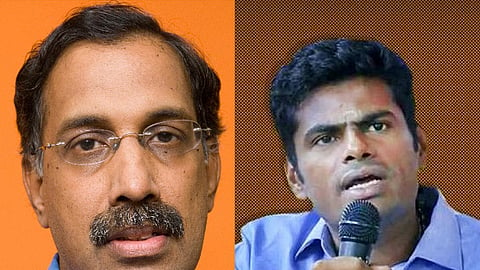

The behaviour of Tamil Nadu Bharatiya Janata Party (BJP) President K Annamalai with the media has triggered sharp criticism, particularly from the media fraternity. Annamalai, a police officer turned politician, has been accused of adopting bullying and intimidation tactics when confronted with tough questions from journalists.
The controversy surrounding Annamalai's interaction with the media reached a new low on Sunday, October 1, when a woman journalist associated with Puthiyathalaimurai asked him about his political future after AIADMK’s exit from the National Democratic Alliance. The journalist inquired whether he would remain with the BJP if he were removed from the post of state president. Annamalai's response was excessive and unsettling, as he resorted to bullying and intimidation. He not only asked the reporter to stand next to him but also took a patronising tone, questioning the legitimacy of her query, and attempted to instruct her on how to ask questions.
Puthiyathalaimurai's editorial director S Srinivasan defended the journalist and condemned Annamalai's behaviour in no uncertain terms. “What happened on Sunday is unacceptable. As a reporter, it is her right to ask any question she wants. The question she asked was legitimate and there was nothing wrong with it. As journalists, we are taught to not be afraid of asking any kind of questions. Even if it sounds simple, one has the right to ask the question. I think she did her job and she did it well,” he added.
He expressed his concern over a growing trend among politicians to counter question journalists instead of providing straightforward answers. Srinivasan highlighted a past incident involving a reporter's interaction with Tamil Nadu Congress Committee president KS Alagiri, who dismissively responded with "Your question is completely wrong". He emphasised that it is the duty of politicians to respond to questions from journalists, and such dismissive attitudes are detrimental to democracy.
These are not isolated incidents in Tamil Nadu, where reporters have often faced hostility from political leaders for asking probing questions. Leaders like NTK’s Seeman and Annamalai have engaged in heated exchanges with journalists when confronted with uncomfortable questions. Srinivasan stressed that those occupying positions of power and responsibility should understand that journalists are merely doing their job, seeking answers on behalf of the public. Attempting to belittle and intimidate them is uncalled for, he said.
Srinivasan also highlighted a disturbing national trend, where journalists are delegitimised and made to feel irrelevant and uneducated. “Such attitudes aim to undermine the credibility of journalists and their role,” he said, urging the media as a whole to take up the issue.
When asked about potential solutions, including journalist unions suggesting boycotting leaders who engage in such behaviour, Srinivasan emphasised the complexity involved in dealing with such situations. He said that boycotting is not a viable solution, as the media's primary responsibility is to report. “You may agree or disagree with a person, but your job is to report that,” he added. Instead, he stressed the importance of making it clear to the political class that such behaviour is unwelcome and unacceptable. “We are doing our job as professionals, this message must be constantly put forth,” Srinivasan pointed out.